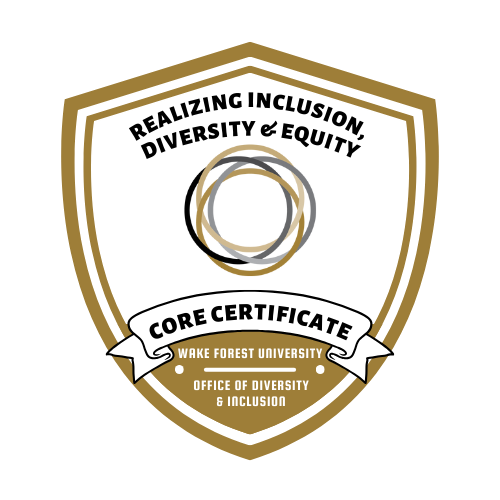Realizing Inclusion, Diversity, and Equity Core Certificate (fall 24 – spring 25)
About
The Realizing Inclusion, Diversity, and Equity Core Certificate was a comprehensive program for faculty, staff, and students designed for their involvement with realizing inclusion, diversity, and equity. Through six comprehensive workshops, participants will explored the principles of diversity, equity, and inclusion, establishing a strong educational foundation for their involvement with the R.I.D.E. framework. By completing the certificate, individuals acquired the knowledge, skills, and empathy needed to navigate diverse environments, promote equity, and champion inclusive practices. Empowered with this understanding, participants are able to cultivate a more inclusive environment within the university community and beyond; embodying Wake Forest University’s commitment to inclusive excellence.
How it worked
Participants completed six workshops to receive the certificate and badge. After participants completed Workshop 1: Foundations of Diversity, Equity, and Inclusion, other workshops were completed in any particular order.
Length to Completion: Participants were able to choose the pace with which they completed the workshops. Given that Workshop 1 was a prerequisite, it was offered 3 times for both students and faculty/staff in fall 2024 and spring 2025.

Participants needed to complete all six core workshops to receive the certificate and badge. Once all workshops were completed, participants will received the badge above that they are able to use in their email signatures and virtual platforms.
Certificate Program Goals
Objective: By the end of the certificate program, participants will have developed a heightened awareness of various dimensions of diversity, learned the importance of equity-minded practices and the ways we can work toward inclusion in academic and professional settings.
Objective: By the end of the certificate program, participants will be able to communicate effectively across all differences and view points.
Objective: By the end of the certificate program, participants will have the tools to be agents of positive change for inclusion. Graduates of the program will be better equipped to lead and support initiatives that promote diversity, equity, and inclusion for all members of our community, within their respective spheres of influence.
Certificate Holders
(Listed with Permission)
- Amy Willard
- Angela G. King
- Anna Donze
- Antayzha Wiseman
- Becca Fuss
- Deb Marke
- Donell Moore
- Eudora Struble
- Hannah Dean
- Jackie Friedman
- Jay Sauerman
- Jean Anne Semke
- Jessica Francis (she/her)
- Justin-Ray Dutton
- Kari Reece
- Leigh Myers
- Meredith Parker
- Sarah Frederick
- Shan Woolard
- Sheila S Thrower
- Vicky Zickmund

